 Rudderless
Rudderless
Starring Billy Crudup, Anton Yelchin, Felicity Huffman, Laurence Fishburne and William H. Macy
Directed by William H. Macy
From Samuel Goldwyn Films
Rated R
105 minutes
by Michael Clawson of Terminal Volume
What is the weight of a song? Where does its spirit reside? And how does it ensnare us in its rapturous grasp?
I first saw Almost Famous at an impressionable age, when movies didn’t just thud at your feet, but cratered into your soul. The Cameron Crowe film reaffirmed something I already knew, but in a beautiful way: there are songs (and albums and bands) in this world that change the fabric of your being. That was a lesson that the charismatic guitarist Russell Hammond helped teach in Stillwater, Almost Famous’ fictitious rock group.
So it pleased me to no end to see Russell Hammond, more precisely Billy Crudup, once again on a stage teaching us about the cosmic-spiritual connection that music initiates within us.
Crudup stars in Rudderless, a delicate, though overreaching, drama about a father carrying on the troubled music of his dead son. The film opens on the son, who we only really see once until a fateful news story about a school shooting. His father, ad executive Sam (Crudup), takes it hard and falls into alcohol, depression and then poverty. We pick up with him two years later, when a wayward box of his son’s mementos turns up at his doorstep. Inside are old notes, demos and lyric sheets — a time capsule of unlived musical dreams.
As a way to reacquaint himself with his son, and to get out of the ratty sailboat where he’s living, Sam learns the music and takes it to an open-mic night, where the music is a hit. He attracts the attention of Quentin (Anton Yelchin), a younger musician who won’t let Sam rest until they start performing together. They form a band, their shows get bigger, they develop a following, and the whole time Sam is concealing a dark secret — his dead son is the writer of all his music.
Rudderless is directed and co-written by William H. Macy, whose filmmaking lacks the depth and nuance of the captains who have directed him — the Coen Brothers, Paul Thomas Anderson, Rob Reiner, to name a few — although he clearly learned, if only through osmosis, what a great story looks and feels like. Some of the sequences are thrown together and chaotic, including a sabotaged boat regatta, and other scenes could be written with more depth and understanding of the central characters. But, as they say, Rudderless has good bones. It has a story to tell, and it’s a whopper.
Central to the plot is a twist so monumental, so audacious, so utterly believable that I’m damned near ready to spoil it just because. I won’t, but the urge is there. The twist comes with a single image, and it’s devastating on a nuclear scale. It alters the very atoms of the movie, a top-to-bottom overhaul. (Recall Spike Lee’s Red Hook Summer. That kind of twist. An epic horizon-flipping twist.)
Crudup plays the heartbroken father with a degree of calmness and ease. He underplays Sam, and it’s a terrific strength. Yelchin, the fiery little dweeb, is fine, too, although his hair is coiffed into a nest of punk tangles, odd for a kid who wants to play folky emo tunes with a 50-something. Laurence Fishburne plays a music store owner who dispenses lots of sage advice, to the youngsters and the adults. Selena Gomez also turns up, as does songwriter Ben Kweller, who plays one of the bandmembers. The music is exceptional, and just perfect for the story Macy is telling.
So what is the existential spiritual role of music in our lives? Rudderless — using warm performances and a story that is worth its weight in gold records — tries, and often succeeds, in getting to the bottom of that question.

 Pride
Pride
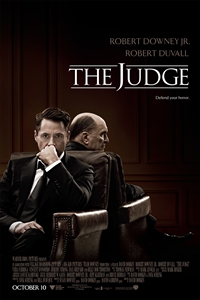 The Judge
The Judge
 The Judge
The Judge
 Kill the Messenger
Kill the Messenger
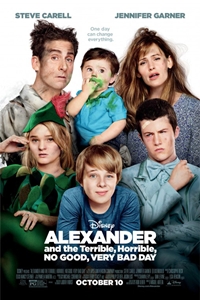 Alexander and the Terrible, Horrible, No Good, Very Bad Day
Alexander and the Terrible, Horrible, No Good, Very Bad Day
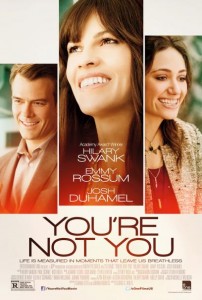 You're Not You
You're Not You
 #Stuck
#Stuck
 The Blue Room
The Blue Room
 Automata
Automata
 Meet the Mormons
Meet the Mormons
 Dracula Untold
Dracula Untold
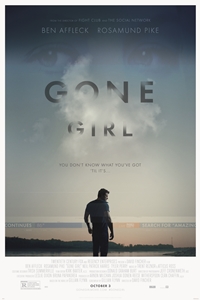 Gone Girl
Gone Girl
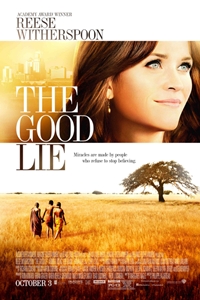 The Good Lie
The Good Lie
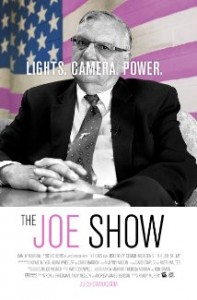 The Joe Show
The Joe Show








